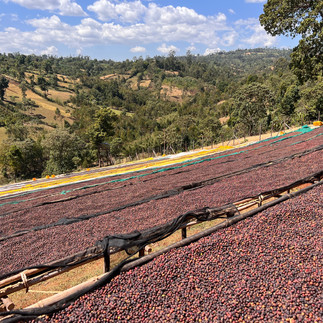Ethiopia: Coffee is part of its History, Economy, and Culture
- ron8764
- Jul 12, 2023
- 5 min read

Ethiopia is the birthplace of coffee and has some of the most dynamic flavors you’ll find anywhere in the world. There are thousands of different types of coffee produced in Ethiopia.

According to popular folklore, coffee was discovered in Ethiopia by a goat herder named Kaldi. The story goes that Kaldi noticed his goats becoming energetic after consuming red berries from a certain plant.
Excited by his finding, Kaldi collected some of the cherries and brought them back to his village. He shared his discovery with the local monks, who were intrigued by the effects of the cherries. The monks experimented with the cherries, discovering that they could be brewed into a flavorful and invigorating drink.
Word of this new beverage spread, and its popularity quickly grew. The stimulating effects and delicious taste of the beverage captivated the locals. It became an integral part of their social gatherings, religious ceremonies, and daily rituals. This newfound beverage soon made its way beyond the borders of Kaffa, spreading across Ethiopia and eventually reaching other parts of the world.
Ethiopia is the largest coffee producer in Africa and the fifth largest in the world. Coffee is one of the country's major exports, generating income for farmers and contributing to rural livelihoods. It is estimated that coffee farming provides employment for millions of Ethiopians, both directly and thru coffee-related activities, including cultivation, harvesting, processing, and trading.
Coffee plants grow mainly in the southern part of the country, and the most well-known coffee-growing regions are: Sidamo, Yirgacheffe, Kaffa, Harrar, Djimmah, Limu, and Guji. Arabica is the primary coffee species grown in Ethiopia.
Sidamo: The coffees from Sidamo are known for their vibrant and complex flavor profiles. They typically exhibit a medium body, bright acidity, and floral and fruity notes. You can expect flavors like jasmine, melon, citrus, blueberry, and wine-like characteristics. Sidamo coffees are often considered to be very aromatic and have a smooth, lingering finish.
Yirgacheffe: Yirgacheffe is renowned for producing some of the finest coffees in the world. Yirgacheffe coffees are known for their distinctively bright acidity, light to medium body, and floral and citrusy flavor notes. You can expect flavors such as jasmine, lavender, lemon, bergamot, and tropical fruits. Yirgacheffe coffees are often praised for their tea-like qualities and delicate complexity.
Kaffa: Kaffa is the birthplace of coffee. Coffees from this region are known for their wild and exotic characteristics. Kaffa coffees often have a full body, moderate acidity, and a rich, earthy flavor profile. You can expect notes of dark chocolate, spices, tobacco, and sometimes fruity undertones. Kaffa coffees tend to have a deep, lingering aftertaste.
Harrar: Harrar coffees are distinctively different from other Ethiopian coffees. They are known for their medium to full body, winey acidity, and complex flavor profile. You can expect flavors like blueberry, strawberry, blackberry, and dark chocolate. Harrar coffees often have a unique, wild, and earthy taste with hints of spice.
Djimmah: Coffees from this region are typically grown at lower elevations and are known for their heavy body and low acidity. Djimmah coffees often exhibit flavors such as dark chocolate, nutty undertones, and mild fruity notes. They are commonly used in blends or as a base for espresso due to their strong, earthy characteristics.
Limu: Limu coffees are characterized by their medium body, medium acidity, and balanced flavor profile. You can expect flavors like floral notes, lemon, berry, and chocolate. Limu coffees often have a clean, bright taste with a sweet and smooth finish.
Guji: Guji coffees are highly regarded for their unique flavor profile and high-quality beans. Guji coffees typically exhibit a medium to full body, bright acidity, and a wide range of flavor notes. The flavor characteristics found in Guji coffees include floral notes, fruity flavors such as berries and stone fruits, hints of citrus, and sometimes chocolate undertones. Guji coffees are often praised for their complexity, bright acidity, and vibrant flavors.
Coffee farming in Ethiopia is predominantly carried out using traditional methods, including organic and shade-grown practices. Farmers often intercrop coffee with other plants, such as fruit trees or vegetables, providing shade and creating a balanced ecosystem. This approach not only enhances the quality of the coffee but also promotes biodiversity and protects the environment.
The coffee harvest in Ethiopia typically takes place between October and January, varying slightly across different regions and altitudes. Handpicking is the preferred method of harvesting, ensuring that only ripe cherries are selected. This meticulous selection process contributes to the high quality of Ethiopian coffee.
After the cherries are harvested, they undergo processing to remove the pulp and parchment and expose the coffee beans. Ethiopian coffee processing methods include both washed and natural processes, each influencing the final flavor profile of the beans.
Washed Process: Also known as the wet process, this method involves depulping the coffee cherries and fermenting them in water for a specific duration. The beans are then thoroughly washed to remove any remaining pulp and dried on raised beds or patios. This process often results in a cleaner cup with bright acidity, floral notes, and pronounced fruitiness.
Natural Process: In this traditional method, coffee cherries are left to dry naturally in the sun or on raised beds, allowing the fruit to ferment and impart flavors to the beans. Afterward, the dried cherries are removed, revealing the coffee beans within. Natural processed Ethiopian coffees offer a fruit-forward experience, with bold, sweet flavors, and a heavy body.
Like other agricultural commodities, coffee prices can be subject to fluctuations in the global market. Factors such as supply and demand dynamics, weather conditions, and global economic conditions can influence coffee prices. Price volatility can impact the income and economic stability of coffee farmers and exporters, making it important for the government and industry stakeholders to navigate market dynamics and promote fair pricing mechanisms.
In Ethiopia, coffee cooperatives play a crucial role in the coffee industry. These cooperatives act as intermediaries between farmers and buyers, collectively bargaining for better prices, providing access to resources and training, and ensuring fair and transparent trade practices. Coffee cooperatives enable smallholder farmers to have a stronger voice in the market, access credit facilities, and improve their economic conditions.
Ethiopia has been actively promoting sustainable and specialty coffee production. Initiatives focus on environmentally friendly farming practices, organic certification, and adherence to fair trade principles. The growing demand for specialty coffee, which emphasizes high-quality, unique flavor profiles, and ethical sourcing, presents opportunities for Ethiopian coffee.
In Ethiopia, coffee is more than just a beverage—it is a way od life and a cultural symbol that reflects hospitality, community, and tradition. The coffee ceremony and the values associated with it have been passed down through generations, preserving the rich heritage and appreciation for this beloved beverage.
The coffee ceremony is an integral part of Ethiopian culture and is performed in homes, cafes, and gatherings across the country. It is a ritualistic process of preparing, brewing, and serving coffee, often accompanied by traditional dress, incense, and engaging conversations. The ceremony can last for hours, creating a space for socializing, storytelling, and strengthening community bonds.
Inviting someone for coffee is a gesture of warmth and friendship. The coffee ceremony is a way to welcome guests, create a sense of community, and engage in meaningful conversations. It is a time to pause, connect, and share experiences.
Coffee is not just reserved for special occasions in Ethiopia; it is consumed daily and woven into the fabric of daily life.















